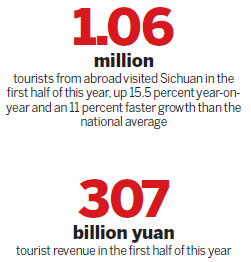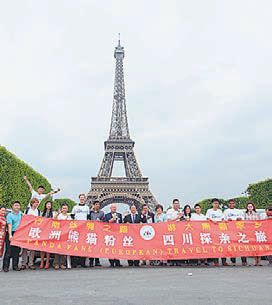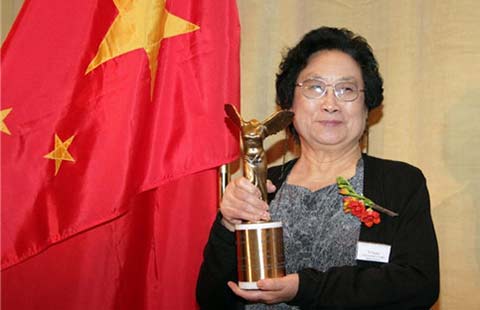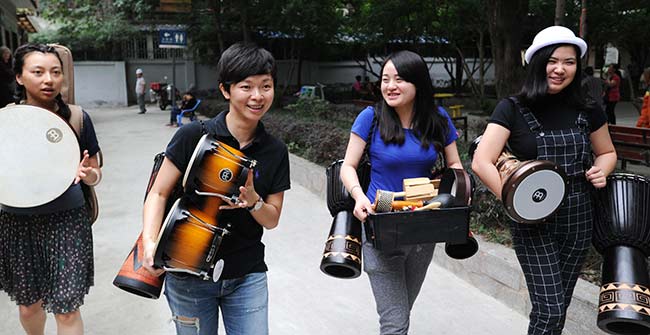Sichuan province boasts world-class tourism resources
By Li Yang (China Daily) Updated: 2015-09-30 08:29
Chengdu, the capital of Sichuan province, won the bid to host the 22nd General Assembly of the United Nations World Tourism Organization in 2017 at the organization's 21st general assembly in Medellin in Colombia on Sept 15.
Li Shihong, deputy head of the National Tourism Administration of China, submitted the Chinese government's bid application to the assembly. Fu Yonglin, vice-mayor of Chengdu, made a presentation on behalf of the bid city and showed a publicity video about Chengdu. The assembly delegates unanimously passed the resolution granting Chengdu the host rights for the next meeting. Taleb Rafai, secretary-general of the World Tourism Organization awarded the resolution book to Li Jinzao, head of the National Tourism Administration of China, at the meeting.
The meeting is held every two years and Beijing was host in 2003. Chengdu will become only the second city in China to host the event.
Analysts said that the decision to hold the world's top tourism organization's general assembly in west China indicates the growing importance the international community is attaching to the fast development of the region. Successfully hosting the event is of great importance to Chengdu and Sichuan province, in their pursuit of greater international influence, stronger tourism economy and becoming a world tourist destination.
In the first half of this year, Sichuan welcomed 1.06 million tourists from abroad, up 15.5 percent year-on-year, an 11 percentage points higher than the national average.
In the past 10 months, panda lovers from six European countries - Britain, France, Germany, Belgium, Austria and Spain -traveled about 21,000 kilometers across 13 countries on the Eurasian continent to reach Sichuan, the home of the giant panda.
The Sichuan government organized a series of promotional activities about the province's tourism, culture and business along the international trade route connecting Sichuan with Asia, the Middle East and Europe, called the Southern Silk Road.
The National Tourism Administration praised the activity as "an innovative trial of tourism promotion" as it uses the ancient Silk Road to deepen mutual understanding of different cultures.
More than 120 foreign media, including Agence France Presse, the Daily Telegraph and the Times, as well as 30 domestic media outlets, including People's Daily and Xinhua News Agency, reported on the event, which tried to send the message that "Sichuan is more than pandas".
During the tourism promotional activities, travel agencies from Sichuan signed 10 cooperation agreements with their counterparts in Britain, France, Germany, Italy, Greece, Turkey and India. The agreements are expected to bring about 40,000 foreign tourists in 210 groups to Sichuan.
Sichuan's rich tourism resources and robust tourism economy, which accounts for about 8 percent of the province's annual gross domestic product, also attracts investors. Wang Jianlin, founder and president of Wanda Group, is one of them.
"Sichuan's annual personal average tourism revenue is only about 900 yuan ($141). There is great potential for Sichuan people to enjoy more profit from tourism with the upgrading of the industry," said Wang. His group plans to invest about 200 billion yuan in tourism-related projects in the province.
"Losing the opportunities in Sichuan means losing the next 20 years (for investors)," said Wang during his visit to the province on April 24.
On July 23, the Sichuan government hosted the first China (Sichuan) International Tourism Investment Conference, themed "Invest in Sichuan, invest in the future", in Chengdu. Twelve cities and prefectures in Sichuan signed 20 cooperation agreements, worth 39.37 billion yuan in all, with a host of tourism agencies, banks and investment enterprises.
During his keynote speech at the conference opening ceremony, Sichuan Party chief Wang Dongming pointed out that investment is still an important driving force for boosting the growth of the Chinese economy. Tourism is a promising sunrise industry, he said. Sichuan has exceptional advantages in tourism resources, so investing in the province, especially the tourism industry, is a promising investment option, he added.
Last year, Sichuan's overall tourism revenue hit 489.1 billion yuan, up 26.1 percent year-on-year. In the first half of this year, tourism revenue reached 307 billion yuan, an increase of 28.6 percent.
China is now the world's third-largest tourist destination and national tourism accounted for more than 10 percent of China's GDP last year.
Liyang@chinadaily.com.cn

|
The giant panda fans' route from Europe to Sichuan province in China |
|
Panda admirers from Europe dance with girls from the Yi ethnic group in Sichuan province |
|
Panda fans from Europe who took part in a driving tour from Europe to Sichuan province stopped off at the Eiffel Tower in Paris. |
(China Daily 09/30/2015 page12)
- Nanjing Massacre files inscribed on Memory of World Register
- Smoking may claim lives of 1 in 3 young Chinese men
- CPC expels media exec over UK 'green card'
- Overseas travel booms during 'golden week' holiday
- 'Queen of Ivory' faces charge in Tanzania
- China, US set ties 'in right direction'
- China's Forbidden City widens its reach to the public
- Leading aircraft manufacturer poised to export new fighter jet
- Fujian governor investigated for suspected disciplinary offenses
- Meeting on Taiwan affairs seen as a boost to relations










